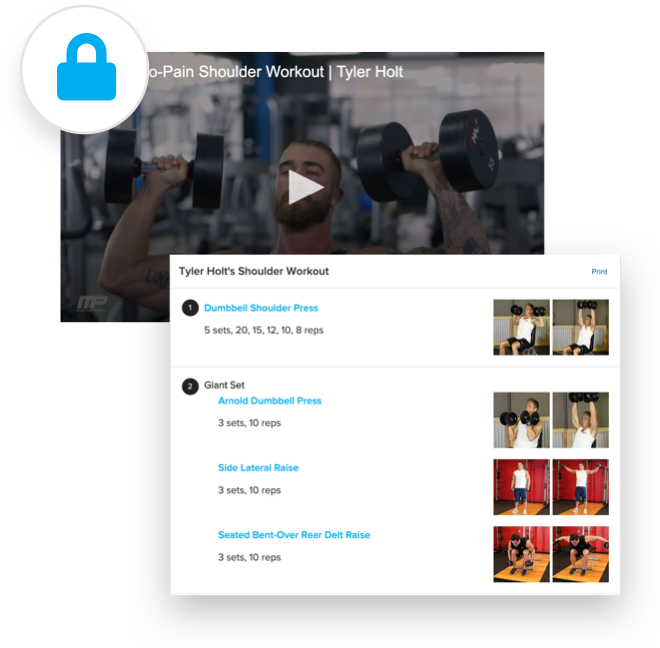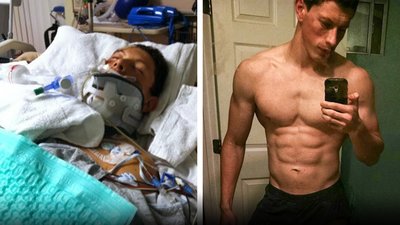At 19, David Mendoza was just finding himself in the world. He started lifting, meeting new people, and bought his first motorcycle. He was living his dream.
But in one cruel second, a motorcycle accident forever changed David's path, challenging his famously positive attitude and making even the most basic of tasks excruciatingly painful.
This is David's story.

Age: 20, Height: 6'1", Weight: 208 lbs., Body Fat: 20%

Age: 21, Height: 6'1", Weight: 185 lbs., Body Fat: 12%
What do you remember about the accident?
I was riding my motorcycle to school one morning about three years ago when I was blindsided by a speeding car. Both my legs broke upon impact, my left femur piercing through. I broke both ankles, fractured my hip, dislocated my shoulder, broke my wrist, displaced my kidney, tore my bladder, and fractured my spine. I was thrown more than 75 feet and was coughing up blood and bleeding severely.

I vaguely remember being put into the back of an ambulance while my jeans were cut open to provide first responders better access to the wounds. The police report said I was able to give an officer my dad's phone number, but those are details I don't even remember.
I woke up three days later in the hospital, a breathing tube inserted into my throat and my body covered in bandages. I felt as if I were dreaming. I looked around and could see my mother and sisters, even the one who lived a state away. Clearly, this was serious. My mind was still numb from all the painkillers they fed me, but I was beginning to realize deep down this wasn't a dream.
As I gained more awareness, I questioned whether I'd ever be able to walk again. To stay calm in that moment, I focused inwardly and tried to move every part of my body, just to test whether I could. I twitched and managed to move my hip ever so slightly. If I could do that in this condition, I knew I'd be able to walk again.
How were you able to stay positive and determined?
I've always been very competitive and dedicated myself to working harder than anyone else to exceed my goals. Whether pursuing activities like football, lifting, and running track, or in other areas of life such as college and my first sales job, I was driven to be the best. I saw that coming back from this was just a different kind of challenge.
Setbacks in life happen for a reason, and previous life experiences have taught me inner strength and calmness. I'd done meditation and practiced how to clear my mind, focus inwardly, and take better control of situations that affect me. Riding the motorcycle taught me to remove doubt from my mind, because any doubt or hesitation could kill you. This was the direction my life had taken, so it was useless to pout or give up. This became just another obstacle I knew I could overcome.

The two-week hospital stay was hellish. I was in seemingly never-ending agony, and I faced plenty of challenges. I no longer had energy to waste on negative thoughts. I discovered singing and humming helped, and, well, the pain meds took away my inhibitions, so I felt no embarrassment doing it loudly.
Our thoughts are powerful. It really comes down to how we choose to perceive the world. I can't allow myself to sound like a victim of my circumstances, and I don't feel I am. Our reality is so intimately connected to our thoughts.
How did you deal with the long road to recovery?
Every day, I felt just slightly better than the day before; I was discharged after two weeks but still required medical equipment at home. I was confined to bed for a while, which required finding ways to stay sane while letting my body slowly repair itself. Glad to no longer be fed hospital food, I returned to my normal, clean diet. Given that I wasn't exercising, I put on about 30 pounds, but I knew I could easily lose the weight later, and my body needed the extra nutrients to repair itself.
I worked on slowly bending my legs, because they had become locked in a straightened position. Every inch I could bend them was a huge accomplishment! I also squeezed and contracted muscles in bed to gain control over them. I have to admit, it was sad to see how soft I was getting, after I had worked so hard to build myself up. Every day, however, was one step closer to getting back to where I was.

How did you get back on your feet?
Being in bed for the first month and a half, I eagerly awaited physical therapy. My legs had atrophied so much I could barely handle my own weight standing any longer than a few seconds. It was humbling. Once I started, though, I quickly progressed through basic movements, and I increased my exercise volume so quickly it surprised even my therapists.
After getting cleared to lift weights again—maybe one of the best days of my life—I started walking 7 miles home from PT once a week. Every step was challenging, but I pushed myself and made it home. The next day, I was so sore I needed to use my crutches again around the house. I never realized how many muscles were involved in just walking! I continued to progress into jumping rope, and later, I even jogged down the block for the first time!
I met my first goal of losing the 30 pounds of body fat I'd put on. My next goal was to build my strength back and squat again. I had to start with just the bar, but I worked back up to 275 pounds for 10 reps. I made 325 [for reps] my next goal. I also brought my bench back to 225 pounds for 4 reps. It ultimately took two years.
Where do you go from here?
Right now, I want to continue progressing in the weight room until I'm even stronger than I was before the accident. I've set new, higher goals. I want to be able to squat 425 pounds for 10 reps again, bench over 300, and run a 400-meter dash in under 56 seconds. The successes I've achieved mean I can still do more. I can say without a shred of doubt that anything is possible for me.


